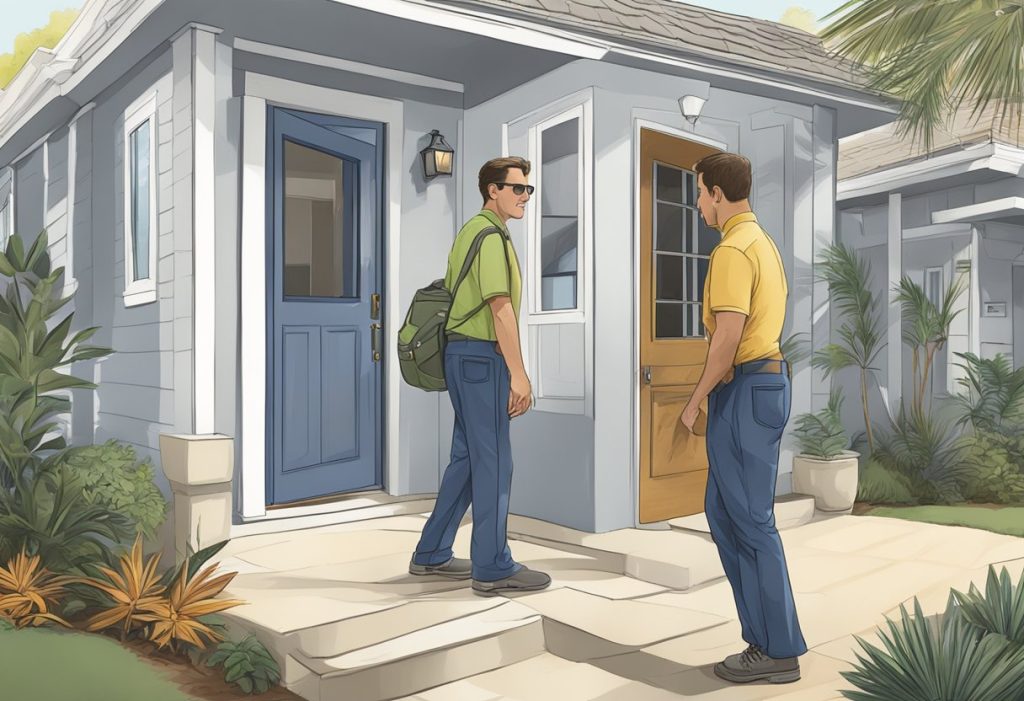Last Updated on March 18, 2024 by Kelvin Nielsen
As a tenant in Florida, you have certain rights when it comes to your landlord entering your rental unit. The question of whether a landlord can enter without permission in Florida is a common one, and the answer is not always straightforward.
In general, landlords must provide notice and obtain your consent before entering your unit, but there are some exceptions to this rule.

According to Florida law, landlords must provide reasonable notice before entering a rental unit, unless there is an emergency or the tenant has abandoned the property. Reasonable notice is typically considered to be 12 hours, but this can vary depending on the situation.
If your landlord fails to provide notice or enters your unit without your consent, they may be violating your rights as a tenant. However, there are some situations where a landlord may be allowed to enter your unit without notice, such as in the case of an emergency or to make necessary repairs.
Related Posts:
- Florida Landlord Tenant Law Utilities
- Florida Landlord Responsibilities
- Renters Rights in Florida for Repairs
Understanding Landlord Entry Laws in Florida
As a tenant in Florida, it is important to understand your rights and the legal grounds for landlord entry into your rental unit. Florida law provides specific guidelines that landlords must follow when entering a tenant’s rental unit.
Legal Grounds for Entry
A landlord in Florida can enter a tenant’s rental unit for specific reasons, such as making repairs, performing maintenance, or showing the unit to prospective tenants.
Landlords can also enter in the case of an emergency, such as a fire or flood. However, landlords cannot enter without proper notice or the tenant’s permission, except in cases of emergency.
Notice Requirements for Landlords
Florida law requires landlords to provide written notice to tenants before entering their rental unit. The notice must be provided at least 12 hours before the entry, except in cases of emergency. The notice must include the date, time, and purpose of the entry.
Tenant Rights and Privacy
As a tenant in Florida, you have the right to privacy in your rental unit. Your landlord cannot enter your unit without proper notice or your permission, except in cases of emergency. Additionally, your landlord cannot enter your unit to harass or intimidate you.
Your rental agreement may also include specific provisions regarding landlord entry. It is important to review your rental agreement to understand your rights and obligations as a tenant.
Landlords are responsible for maintaining habitable rental units. This includes making necessary repairs and performing regular maintenance. However, landlords must follow proper notice requirements before entering a tenant’s rental unit.
Related Posts
- What a Landlord Cannot Do in Florida
- When Does a Guest Become a Tenant in Florida?
- Renter’s Rights in Florida Without a Lease
FL Tenants’ Rights Against Unlawful Landlord Entry
As a tenant in Florida, you have the right to peaceful possession of your rental unit. Your landlord cannot enter your home without your consent, except under specific circumstances. Here are some of your legal rights against unlawful landlord entry.
When Tenants Can Refuse Entry
Your landlord must give you reasonable notice before entering your rental unit, except in case of an emergency. If your landlord wants to enter your home, they must provide you with advance notice, which is usually 12 hours.
You have the right to refuse entry if your landlord does not provide you with reasonable notice, or if they want to enter your home without your consent for reasons that are not specified in your lease.
Legal Actions Against Unlawful Entry
If your landlord enters your rental unit without your consent, you can take legal action against them. You can sue your landlord for damages, and you can also request a court order to prevent them from entering your home without your permission.
If your landlord retaliates against you for exercising your legal rights, you can also take legal action against them.
Preventive Measures for Landlords and Tenants
To prevent unlawful entry, landlords should provide advance notice before entering their tenants’ rental units, except in case of an emergency. They should also specify the reasons for entry in the lease agreement, and they should only enter the rental unit for necessary repairs or to show the unit to prospective tenants.
Tenants should keep their rental units in good condition and promptly report any necessary repairs to their landlord to avoid any misunderstandings.
Conclusion
In conclusion, Florida landlord-tenant law provides tenants with legal protection against unlawful landlord entry. If your landlord enters your rental unit without your consent, you have legal rights and can take legal action against them. By following the duties and responsibilities outlined in your lease agreement, you can protect your right to peaceful possession of your rental unit.
Disclosure: The content herein isn’t a substitute for advice from a professional attorney. It’s only meant to serve educational purposes. If you have a specific question, kindly seek expert attorney services.
Sources: Florida Landlord Tenant Rights, What are My Legal Rights as a Tenant in Florida?

Amanda Rose is a seasoned landlord with 13+ years of expertise in overseeing diverse properties. Her adept management spans single and family homes, along with multi-family apartments and condos, across Wyoming and South Dakota. Her commitment and proficiency have cemented her status as a thriving property management professional.
She is a member of the following organizations: Wyoming Landlord’s Association, National Association of Residential Property Managers (NARPM), Wyoming Apartment Association, South Dakota Multi-Housing Association (SDMHA), and South Dakota Landlord Association (SDLA).







